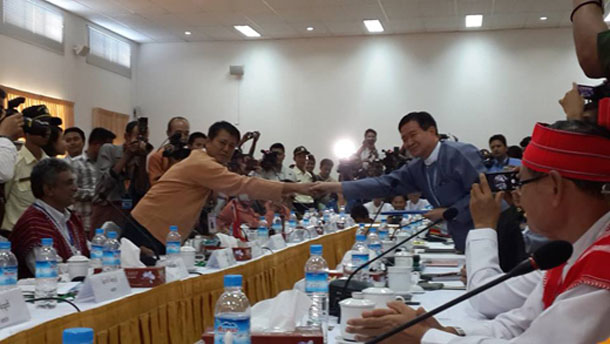The All Burma Students’ Democratic Front (ABSDF), a once outlawed student army, signed a state-level ceasefire agreement with Karen State government representatives on Monday, three days before Burma marks the 25th anniversary of the 1988 pro-democracy uprising.
Than Khe, chairman of the ABSDF, told The Irrawaddy that the accord, signed in Rangoon, was a preliminary step toward broader national reconciliation.
“We will continue discussions to move forward on a nationwide ceasefire and to establish a political dialogue,” he said.
The state-level ceasefire agreement was signed with Karen State’s border affairs minister, Col Aung Lwin, as well as State Chief Justice Thein Lwin and senior officials from Burma’s southeastern military command. The two sides agreed in principle to allow ABSDF members to travel freely within specified areas controlled by the group’s ethnic allies.
The meeting was originally scheduled to take place in the Karen State capital Pa-an on Sunday, but the ABSDF changed the meeting’s date and location due to recent heavy rains and flooding that have displaced more than 30,000 residents across the state.
The ABSDF formed in November 1988 after student activists fled to border areas to fight against Burma’s military regime. Its members are based in the northern, western and southern border areas of the country. In the north, they have forged alliances with ethnic Kachin rebels, and in the southeast with ethnic Karen rebels.
The group had held two formal discussions and three informal gatherings with the government prior to Monday’s meeting.
The signing of the preliminary ceasefire agreement was witnessed by Border Affairs Minister Lt-Gen Thet Naing Win, President’s Office Minister Aung Min and Immigration Minister Khin Ye. Parliamentarian Thein Zaw, who serves as deputy chairman of the government’s peace team, and 88 Generation leaders Min Ko Naing and Mya Aye were present as well. International observers from the Nippon Foundation, and the Center for Peace and Conflict Studies also attended.
“We understand that we have not reached our goal in this long journey, which began in 1988,” said Than Khe, the ABSDF chairman. “But we need to move forward to win democratic gains and achieve a federal system for ethnic autonomy, by working together with other colleagues. A ceasefire does not mean we are going to lay down our arms.”
He said he hoped the ceasefire agreement would be a step toward more inclusive political dialogue between the government and ethnic minority groups.
ABSDF members this week will join the Silver Jubilee of the 1988 pro-democracy uprising, which will be commemorated in Rangoon and nationwide. The group will continue discussions concerning a Union-level political dialogue on Saturday.

















